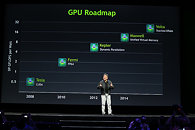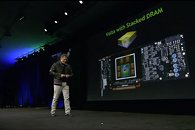- Joined
- Oct 9, 2007
- Messages
- 47,637 (7.44/day)
- Location
- Dublin, Ireland
| System Name | RBMK-1000 |
|---|---|
| Processor | AMD Ryzen 7 5700G |
| Motherboard | Gigabyte B550 AORUS Elite V2 |
| Cooling | DeepCool Gammax L240 V2 |
| Memory | 2x 16GB DDR4-3200 |
| Video Card(s) | Galax RTX 4070 Ti EX |
| Storage | Samsung 990 1TB |
| Display(s) | BenQ 1440p 60 Hz 27-inch |
| Case | Corsair Carbide 100R |
| Audio Device(s) | ASUS SupremeFX S1220A |
| Power Supply | Cooler Master MWE Gold 650W |
| Mouse | ASUS ROG Strix Impact |
| Keyboard | Gamdias Hermes E2 |
| Software | Windows 11 Pro |
NVIDIA updated its GPU micro-architecture roadmap at the 2013 GPU Technology Conference (GTC). Currently spearheaded by the "Kepler" micro-architecture, which drives its GeForce, Quadro, and Tesla product lines, and which will drive Tegra mobile SoCs in 2014; NVIDIA's next-generation "Maxwell" could make its debut some time in 2014. Going by NVIDIA's graph that puts performance-per-Watt against time, "Maxwell" should nearly double performance. Maxwell GPUs feature unified virtual memory, which lets CPUs treat graphics card memory as system memory, for faster general-purpose performance.
Although not backed by a tentative launch year, and assuming "Maxwell" has its run for another two years, 2016 could see the launch of NVIDIA's "Volta" GPU micro-architecture. In addition to advancements by its predecessors, "Volta" could introduce stacked DRAM technology. It would enable GPU memory bandwidths as high as 1 TB/s. Current high-end graphics cards such as GeForce Titan and Radeon HD 7970 GHz Edition, are capable of breaching the 300 GB/s mark, so NVIDIA's claims don't sound far-fetched.


View at TechPowerUp Main Site
Although not backed by a tentative launch year, and assuming "Maxwell" has its run for another two years, 2016 could see the launch of NVIDIA's "Volta" GPU micro-architecture. In addition to advancements by its predecessors, "Volta" could introduce stacked DRAM technology. It would enable GPU memory bandwidths as high as 1 TB/s. Current high-end graphics cards such as GeForce Titan and Radeon HD 7970 GHz Edition, are capable of breaching the 300 GB/s mark, so NVIDIA's claims don't sound far-fetched.


View at TechPowerUp Main Site













